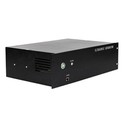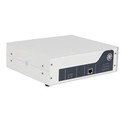Can an ultrasonic tank filter be used in a food processing tank? This is a question that many in the food processing industry have been asking, and as a supplier of ultrasonic tank filters, I'm here to provide a comprehensive answer.
Understanding Ultrasonic Tank Filters
Before delving into whether ultrasonic tank filters can be used in food processing tanks, it's essential to understand what these filters are. An Ultrasonic Tank Filter is a sophisticated piece of equipment that combines the principles of ultrasonic technology with traditional filtration methods. Ultrasonic waves are used to enhance the filtration process by dislodging particles from the filter media, preventing clogging and improving the overall efficiency of the filtration system.
The ultrasonic waves create cavitation bubbles in the liquid. These bubbles implode near the surface of the filter media, generating high - energy shockwaves. These shockwaves effectively remove contaminants that have adhered to the filter, allowing the filter to maintain a high flow rate and filtration efficiency over a longer period compared to conventional filters.


Requirements for Food Processing Tanks
Food processing tanks have very specific requirements. Firstly, any equipment used in these tanks must comply with strict food safety regulations. This means that the materials used in the construction of the filter must be non - toxic, resistant to corrosion from food products and cleaning agents, and easy to clean and sanitize.
Secondly, the filtration system must be able to remove a wide range of contaminants, including particles, microorganisms, and even some chemical impurities. For example, in the dairy industry, the filter needs to remove milk fat globules, casein particles, and potential pathogens. In the fruit juice industry, it must filter out pulp, seeds, and any spoilage - causing bacteria.
Advantages of Using Ultrasonic Tank Filters in Food Processing Tanks
Enhanced Filtration Efficiency
One of the primary advantages of using an ultrasonic tank filter in a food processing tank is its ability to maintain high filtration efficiency. In food processing, continuous and efficient filtration is crucial to ensure product quality. As mentioned earlier, the ultrasonic waves prevent clogging of the filter media. This means that the filter can operate at a consistent flow rate, reducing the need for frequent filter changes and minimizing downtime in the production process.
Improved Product Quality
By effectively removing contaminants, ultrasonic tank filters can significantly improve the quality of the food products. For instance, in the production of clear fruit juices, a high - quality filtration system can remove all visible particles, resulting in a clearer and more appealing product. In the meat processing industry, it can help remove blood clots, bone fragments, and other impurities, enhancing the safety and quality of the final product.
Cost - Effectiveness
Although the initial investment in an ultrasonic tank filter may be higher than that of a traditional filter, in the long run, it can be more cost - effective. The reduced frequency of filter replacements and the lower downtime due to clogging can lead to significant cost savings. Additionally, the improved product quality can lead to higher market prices and increased customer satisfaction, which can translate into greater profits for the food processing company.
Challenges and Considerations
Material Compatibility
As mentioned earlier, material compatibility is a crucial consideration. The ultrasonic tank filter must be made from materials that are approved for use in food processing. For example, the filter housing should be made of stainless steel, which is non - toxic, corrosion - resistant, and easy to clean. The filter media also needs to be carefully selected to ensure it does not leach any harmful substances into the food product.
Cleaning and Sanitization
Proper cleaning and sanitization are essential in food processing. The ultrasonic tank filter should be designed in such a way that it can be easily disassembled for thorough cleaning. The ultrasonic technology itself can assist in the cleaning process, as the cavitation effect can help remove stubborn contaminants during the cleaning cycle. However, additional cleaning agents and procedures may still be required to meet the strict hygiene standards of the food industry.
Regulatory Compliance
Food processing is a highly regulated industry. Any equipment used in food processing tanks must comply with local and international food safety regulations. As a supplier, we ensure that our Ultrasonic Tank Filter meets all relevant standards, such as FDA regulations in the United States and EU regulations in Europe. We also provide detailed documentation and support to help our customers demonstrate compliance during inspections.
Case Studies
There are several successful case studies of ultrasonic tank filters being used in food processing tanks. In a large - scale beer brewing company, an ultrasonic tank filter was installed in the fermentation tank. The filter was able to remove yeast cells, hop particles, and other impurities more efficiently than the previous filtration system. This led to a clearer beer with a more consistent flavor profile. The reduced clogging also meant that the brewery could operate the filtration system for longer periods between maintenance, increasing overall production capacity.
In a vegetable oil processing plant, an ultrasonic tank filter was used to filter out impurities such as plant debris, free fatty acids, and moisture. The ultrasonic technology improved the separation process, resulting in a higher - quality oil with a longer shelf life. The plant also reported cost savings due to reduced filter replacement and improved product yield.
Conclusion
In conclusion, an ultrasonic tank filter can indeed be used in a food processing tank. It offers numerous advantages, including enhanced filtration efficiency, improved product quality, and cost - effectiveness. However, it is essential to carefully consider factors such as material compatibility, cleaning and sanitization, and regulatory compliance.
As a supplier of ultrasonic tank filters, we are committed to providing high - quality products that meet the specific needs of the food processing industry. Our Ultrasonic Tank Filter is designed with the latest technology and constructed from food - grade materials to ensure compliance with all relevant regulations.
If you are in the food processing industry and are interested in exploring the use of ultrasonic tank filters in your operations, we invite you to contact us for a detailed discussion. Our team of experts can provide you with more information, technical specifications, and even arrange for a demonstration of our product. Let's work together to improve the efficiency and quality of your food processing operations.
References
- Food and Drug Administration (FDA). (Year). Food safety regulations for processing equipment.
- European Union (EU). (Year). Regulations on food hygiene and safety.
- Industry reports on the use of ultrasonic technology in food processing.






